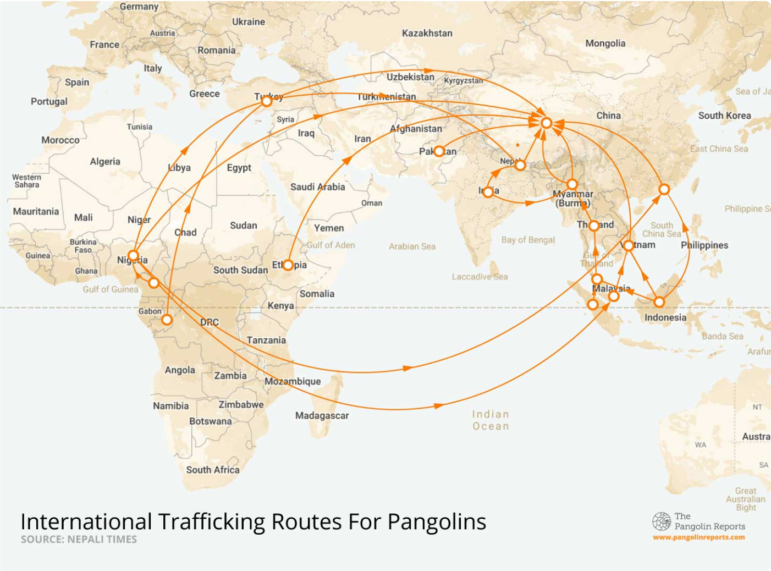
The illicit trade in pangolins, a harmless ant-eating mammal close to extinction, is booming. Photo: Tsai Yao-Cheng / The Reporter
It all started at the Asian Investigative Journalism Conference in Seoul fifteen months ago. A group of journalists from across Asia met in the lobby of the conference venue to discuss how we could work together. We found an issue close to our hearts: the global trafficking of pangolins, a harmless ant-eating mammal which is close to extinction and that is — at least in theory — protected by international law. Very few people cared. No major media outlet had invested the resources this cross-border, global story would require.
The illicit trade is booming. Tons of pangolin scales are shipped illegally across Asia and Africa to China and other Asian markets to be sold as ingredients for traditional Chinese medicine. It is tragically pointless: The scales have no medicinal value, except perhaps a placebo effect. More importantly, our reporting on the illegal trade suggests that criminals across continents collaborate and compete to cater to the needs of pharmaceutical companies in China and elsewhere.
We sprang into action and started The Pangolin Reports. As a group of senior editors in Asia with a broad global network, we secured seed funding from the ADM Capital Foundation in Hong Kong. Then we recruited reporters and partnering media outlets.

The main international routes used to traffic pangolins, mapped with data from Nepali Times. Image: The Pangolin Reports
They had to agree on three conditions that built on the experience of previous collaborative projects we had been part of: we report collaboratively, we edit collaboratively, and we distribute collaboratively. In return, we tried to go beyond those experiences by empowering and training local media and giving them the resources they needed to tell the stories in their own ways for their audiences. We provided expertise and connections, top-notch editing, and paid for some reporting expenses.
“The beauty of The Pangolin Reports is that it was investigated, reported, and written by local journalists — working in their own countries, their own language, and their own cultures,” said Joyce Lau, an editor for the Hong Kong-based project.
“We learned that what we report for our readers could also be of interest to readers elsewhere,” said Tin Htet Paing, a senior reporter at Myanmar Now in Yangon. “Reporting and editing the story together with a Chinese reporter gave us context we needed and gave him the information he needed, and then we could both tell a much better story to our respective audiences.”
By last count, more than 40 journalists, including data editors, video journalists, podcast producers, coders, and designers from 19 newsrooms in 14 countries have participated in the project.
At the Global Investigative Journalism Conference in Hamburg in September, we released Trafficked to Extinction, a collaborative 10,000-word global investigation into the trade. It shed light on the incentive structure behind the sellers, smugglers, and buyers. It uncovered evidence of links to organized crime. It showcased alternative models for preservation. It has generated more than 50 local media investigations in Africa and in Asia. It has or is being translated into Thai, Burmese, Nepali, Bahasa, Flemish, Chinese (mainland China), and Chinese (Taiwan). It has also led to a corruption investigation in Malaysia.
Most importantly, our effort has created bonds between journalists and networks that will outlast the project. Leading reporters in Myanmar and Vietnam now know who to call if they have a story on environmental crimes tied to a company in China. Thai reporters can informally follow up with colleagues across the border in Malaysia if there’s another case of smuggling at the border.
The pangolins project was our proof of concept, but we’re only getting started. There is so much more work that needs to be done on a structural level to connect local reporters across the region and globally. Only if we empower local journalists across Asia, and beyond, can we tell the environmental stories that matter to the audiences that are most directly affected by them. We’ll share more on this later in the year.
Here are the 10 lessons for editors or project managers we learned over the year:
1. Mindset is paramount. Collaborations only work when editors and reporters understand that they all benefit from sharing their reporting, their visuals, and their expertise, and that editors have at heart the collective interest of producing the best story possible. For international media, that means being inclusive — respect local reporters and don’t just use them as fixers or interpreters.
2. Address newsroom needs and know where you stand. The project that seems like it’s trailblazing to you is not necessarily the top priority of partnering newsrooms. Plan and communicate accordingly.
3. Avoid newsroom hierarchies and work directly with reporters. The newsrooms that insisted on channelling communications through editors proved to be the least effective in reporting and in terms of output. In return, project management status and next steps need to be transparent and easily accessible for editors.
4. Support and guide, don’t dictate. The journalists must know that the editors are there to support and elevate their reporting, not dictate coverage.
5. Know the team’s skills and leverage them accordingly. Some are better at reporting; others are better at writing; others are better at distribution. Recruit diverse skill sets as needed by the project. Build a team that is diverse in skills, language ability, and local knowledge for maximum effect and impact. Dive deep into local talents.
6. Use all means available to collaborate remotely. We used Slack for messaging; Google Drive, docs and spreadsheets for storage, writing and editing; and Zoom for video conferences. Deploy security measures as befitting the topic and the environment.
7. Don’t underestimate the time commitment. Collaborating takes more time than traditional reporting in the beginning but gradually becomes more efficient as new workflows develop. Create systems that aren’t too inconvenient, but be mindful of security concerns.
8. Be flexible. Collaborations are based on goodwill, trust, and shared values. We can’t force anyone to do anything. If a media company decides against an assignment, an edit or sharing its content, then there’s very little that can be done about it.
9. Be generous and share the work. The goal is maximum reach: We released our shared report under the Creative Commons’ BY-NC-ND license to make sure that our reporting and publishing partners are free to re-use each others’ content without going through too many administrative hoops. Sharing allows the partners to translate our reports into other languages and publish them with ease. (It took a lot of talking to convince some executives that they would benefit from the added reach.)
10. Persevere. There are amazingly skilled and dedicated journalists in newsrooms out there. It is our task to create conditions for them to thrive.
For now, we are wrapping up The Pangolin Reports while working on two podcasts, one in English and one in Chinese, about our project’s work. R.age, our partner in Malaysia, is taking the lead to create a graphic story book for use in schools. The core editing team is working on turning the reporting collective into a more permanent setup to pursue more collaborative environmental reporting. As we move on to explore other burning environmental issues, many newsrooms will no doubt continue to report on the plight of the pangolins.
If you’re interested in working with us, please subscribe to our newsletter and get in touch with us at contact@pangolinreports.com.
Patrick Boehler and Ying Chan are co-founders of the Environmental Reporting Collective and editors of The Pangolin Reports.
 Patrick Boehler is an executive editor at SWI swissinfo.ch, the international service of the Swiss public broadcaster. He previously worked for the New York Times, the South China Morning Post, and other media in Asia, and taught at the Journalism and Media Studies Centre at the University of Hong Kong.
Patrick Boehler is an executive editor at SWI swissinfo.ch, the international service of the Swiss public broadcaster. He previously worked for the New York Times, the South China Morning Post, and other media in Asia, and taught at the Journalism and Media Studies Centre at the University of Hong Kong.
 Ying Chan is an award-winning journalist, educator, and consulting editor for gijnChina. In 1999, she founded the Journalism and Media Studies Centre at the University of Hong Kong and later the Cheung Kong School of Journalism at Shantou University in Guangdong, China. She spent 23 years in New York City covering immigration, campaign finance, and US-China relations for the New York Daily News, NBC News, and Chinese language dailies.
Ying Chan is an award-winning journalist, educator, and consulting editor for gijnChina. In 1999, she founded the Journalism and Media Studies Centre at the University of Hong Kong and later the Cheung Kong School of Journalism at Shantou University in Guangdong, China. She spent 23 years in New York City covering immigration, campaign finance, and US-China relations for the New York Daily News, NBC News, and Chinese language dailies.

Good to have this initiative in place, in Malawi (Africa) a Chinese national is sentenced to two years in prison for being found in possession of a Pongolin